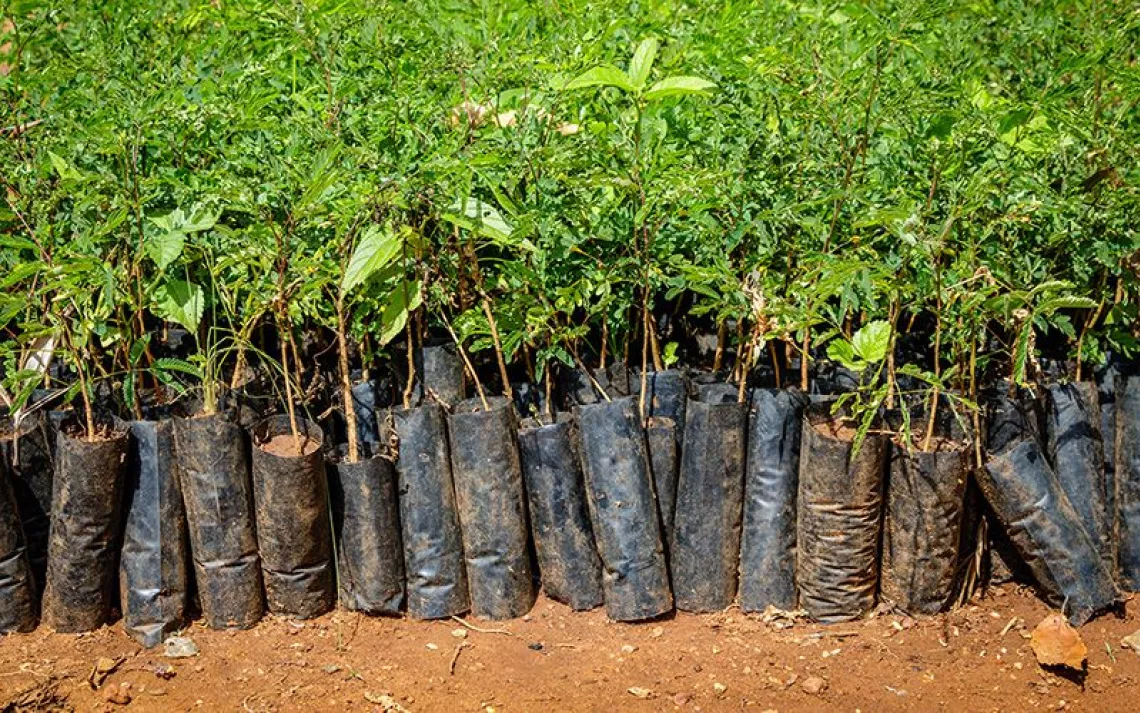| Criteria | Points | Scoring Basis |
| Peer-to-peer sustainability educator program | 7 | Institutions earn all available points by having a peer-to-peer educator program that reaches degree-seeking students. |
| Student sustainability outreach campaign | 10 | Institutions earn 3/4 of available points for having at least one sustainability-related outreach campaign directed at students. Institutions earn 1/4 of available points for verifying that program with a website link. |
| Sustainability during orientation for new students | 7 | Institutions earn all available points for including sustainability prominently during new-student orientation events. |
| Sustainability outreach and publications | 7 | Institutions earn 1/10 of available points for each website, newsletter, and/or other literature that fosters sustainability awareness. |
| Sustainability student group | 7 | Institutions earn all available points for having at least one active student group focused on sustainability. |
| Organic garden | 10 | Institutions earn all available points for having one or more programs that allow students to gain experience in organic agriculture and sustainable food systems. |
| Sustainability events | 7 | Institutions earn all available points for hosting major events (conferences, symposia, etc.) related to sustainability. |
| Outdoor program | 10 | Institutions earn all available points for having a program that organizes outings for students and teaches "leave no trace" principles. |
| Sustainability-themed semester, year, or first-year experience | 10 | Institutions earn all available points for having chosen a sustainability-related theme for their themed semester, year, or first-year experience over the past three years. |
| Sustainability courses | 12 | Institutions earn all available points when sustainability-focused courses make up 20% or more of all courses offered. Incremental points are available. |
| Sustainability-related courses | 12 | Institutions earn all available points when sustainability-related courses make up 20% or more of all courses offered. Incremental points are available. |
| Sustainability learning outcomes | 12 | Institutions earn all available points when 20% of students graduate from programs that have adopted at least one sustainability learning outcome. Incremental points are available. |
| Undergraduate program in sustainability | 10 | Institutions earn all available points for offering at least one sustainability-focused undergraduate major, degree program, or equivalent. |
| Sustainability immersive experience | 10 | Institutions earn all available points for offering at least one sustainability-focused immersive program. |
| Sustainability literacy assessment | 10 | Institutions earn all available points for conducting sustainability literacy assessments on at least some students. |
| Faculty engaged in sustainability research | 10 | Institutions earn 1/2 of available points by calculating the percentage of faculty engaged in sustainability research. Institutions earn up to the remaining 1/2 based on that percentage. |
| Departments engaged in sustainability research | 10 | Institutions earn 1/2 of available points by calculating the percentage of departments engaged in sustainability research. Institutions earn up to the remaining 1/2 based on that percentage. |
| Sustainability research incentives | 10 | Institutions earn 3/4 of available points for encouraging faculty research on sustainability. Institutions earn 1/4 of available points by encouraging student research. |
| Percentage of existing building space certified as sustainable | 10 | Institutions earn a percentage of total available points equivalent to the percentage of existing building space on campus considered sustainable. |
| Percentage of new building space certified as sustainable | 10 | Institutions earn a percentage of total available points equivalent to the percentage of new building space on campus considered sustainable. Minimum LEED - 20% 3rd LEED - 50% 2nd LEED - 80% Higheest LEED - 100% |
| Scope 1 and 2 emissions inventory | 20 | Institutions earn all available points for conducting an inventory of Scope 1 and 2 greenhouse gas emissions. |
| Scope 3 emissions inventory | 35 | Institutions earn 1/7 of available points for each type of Scope 3 calculation conducted among types outlined in the STARS collector. |
| Local offsets program | 15 | Institutions earn all available points for having an institution-catalyzed program that reduces greenhouse gas emissions in the local community. |
| Food and beverage purchasing policies | 30 | Institutions earn 1/3 of available points by calculating the percentage of food expenditures that are local and community-based, or are third-party-certified responsible (certified organic, fair trade, etc.). Institutions earn a portion of the remaining 2/3 based on that percentage. |
| Vegan options | 7 | Institutions earn all available points for offering complete-protein vegan dining options during every meal in at least one facility on campus. |
| Preconsumer food waste composting | 7 | Institutions earn all available points for having a preconsumer food waste composting program. |
| Postconsumer food waste composting | 7 | Institutions earn all available points for having a postconsumer food waste composting program. |
| Energy consumption in buildings | 50 | Institutions earn 1/3 of available points by calculating total building energy consumption in performance and baseline years. Institutions earn all remaining points by meeting or exceeding a standard reduction of 7% per year since their identified baseline period. Schools that make reductions below the 7% threshold earn partial credit.* |
| Support for clean and renewable energy | 45 | Institutions earn 1/3 of available points by calculating all renewable energy generated by the institution and/or purchased as renewable energy credits. Institutions earn a portion of the remaining points based on that number as a percentage of the institution's total energy consumption. |
| Lighting sensors | 7 | Institutions earn all available points for using occupancy sensors in at least one application. |
| LED lighting | 7 | Institutions earn all available points for using LED lighting in at least one lighting application. |
| EPEAT | 7 | Institutions earn a percentage of available points based on the percentage of computers purchased that are registered EPEAT Silver or Gold. |
| Sustainable cleaning products | 10 | Institutions earn 1/3 of available points by having an institution-wide stated preference for sustainable cleaning products and 1/3 for calculating the percentage of total expenditures spent on sustainable cleaning products. Institutions earn a percentage of the remaining 1/3 of available points based on the percentage of sustainable cleaning products purchased. |
| Responsible paper purchasing | 15 | Institutions earn 1/10 of available points for having a stated policy for responsible paper purchasing. The remainder of available points are awarded based on a sliding scale, depending on the percentage of recycled content: Higher weightings are awarded to purchases of higher recycled content office paper (in 10% buckets). |
| Vendor code of conduct | 7 | Institutions earn all available points by requiring that business partners adhere to environmental and social standards. |
| Campus fleet | 20 | Institutions receive points based on the proportion of their fleet that uses alternative power/fuel, weighted by the type of alternative fuel used. 50% for hybrid, 65% for plug-hybrid, 100% for full electronic. |
| Student commute | 20 | Institutions earn points based on the percentage of students who use more sustainable commuting options. |
| Employee commute | 20 | Institutions earn points based on the percentage of employees who use more sustainable commuting options. |
| Bicycle-sharing program | 11 | Institutions earn all available points by having a bicycle-sharing program. |
| Facilities for bicyclists | 10 | Institutions earn all available points by having bike storage, shower facilities, and lockers for bicycle commuters. |
| Mass-transit programs | 7 | Institutions earn all available points by offering discounted transit passes or a free campus shuttle for commuters. |
| Condensed workweek | 7 | Institutions earn all available points by offering a condensed workweek option to employees. |
| Telecommuting | 7 | Institutions earn all available points by offering a telecommuting program to employees. |
| Carpool/vanpool matching | 7 | Institutions earn all available points by offering a carpool or vanpool matching program and/or offering reduced parking fees or preferential parking spaces to carpoolers. |
| Local housing | 7 | Institutions earn all available points by offering employees incentives to live near campus. |
| Car sharing | 7 | Institutions earn all available points by participating in car-sharing programs. |
| Waste reduction | 25 | Institutions earn all available points by reducing waste generation by 7% or more per year compared to a historical baseline. Incremental points are given based on the percentage of reduction achieved. |
| General waste diversion | 20 | Institutions earn 1/2 of available points by calculating general waste diversion. Institutions earn a percentage of remaining available points based on the percentage of diversion achieved. |
| Waste diversion during new construction and demolition | 20 | Institutions earn 1/2 of available points by calculating waste diversion during new construction and demolition. Institutions earn 1/2 of remaining available points based on the percentage of diversion achieved. |
| Electronic-waste recycling program | 10 | Institutions earn 1/2 of available points by having a program to refurbish, reuse, or recycle electronic waste generated by the school. Institutions earn 1/2 of remaining available points for having a similar program for electronic waste generated by students. |
| Move-in/Move-out waste reduction | 20 | Institutions earn all available points for having a program to reduce move-in and/or move-out waste. |
| Water consumption | 30 | Institutions earn 1/2 of available points by showing ANY reduction in total water consumption since a historical baseline period. Institutions that have reduced their consumption by 6% per year or more across that time frame get the remaining 1/2 of the points, while schools that reduce by less than 6% per year get partial credit based on their reductions.* |
| Storm-water management | 30 | Institutions earn 1/4 of available points for having a policy to mitigate impact of storm-water runoff from construction, development, or other projects, 1/4 for having a policy to mitigate impact of storm-water runoff from normal campus operations, and 1/10 for each (up to five) specific strategy used to implement those policies. |
| Nonpotable water usage | 10 | Institutions earn all available points by using some nonpotable water. |
| Sustainability coordination | 20 | Institutions earn 1/3 of available points each for having a sustainability committee, office, and/or officer. |
| Sustainability plan | 25 | Institutions earn all available points by having a current and formal sustainability plan that covers at least two distinct areas. |
| Committee on investment responsibility | 15 | Institutions earn all available points by having a committee on the social and environmental responsibility of financial investments. |
| Investment disclosure | 20 | Institutions earn all available points by making a snapshot of financial investments accessible to the public. |
| Intercampus collaboration on sustainability | 7 | Institutions earn all available points by collaborating with other colleges and universities to build the sustainability community. |
| Innovations | 40 | Institutions earn 1/4 of available points for each sustainability innovation listed. |
| Energy use by type | 65 | Institutions earn 2/5 of available points by calculating the percentage of electricity from renewable sources (biomas, geothermal, hydro, solar, wind), 2/5 in proportion to how much energy comes from renewable sources, and the remaining 1/5 points by calculating their percentage of heating from biomass or geothermal energy sources. |
| Additional SIERA question on divestment | 60 | Institutions earn 10 points for submitting the survey. Then schools receive the max of the following, if they have made a public decision to divest and have responded to having divested in one of the following categories: 25 pts - Yes, our institution has divested from coal-mining corporations. 30pts - Yes, our institution has divested from coal-mining corporations and coal-dependent utilities. 30pts - Yes, our institution has divested from coal-mining and tar-sands-mining corporations. 50pts - Yes, our institution has divested from all fossil fuels. Then, of the schools that have made a public decision to divest, if they have only done it for directly held shares, then they receive -10 points **It's important to note that some of this data is incomplete due to schools failing to respond to the survey |
| | | |
 The Magazine of The Sierra Club
The Magazine of The Sierra Club



